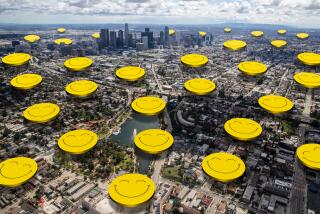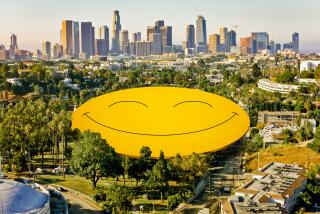Happy at job? It’s how you look at it
Tal Ben-Shahar’s class on happiness was Harvard University’s most popular course last year, surpassing Introduction to Economics. He was in the Los Angeles area this week speaking to the Professional Leaders Project, a workshop for young Jewish professionals. He sat down with The Times for a chat on work and happiness.
What is happiness?
It’s a combination of meaning and pleasure. A happy life is one that has meaningful, purposeful, significant, important experiences. And it’s a life that one experiences pleasure in. It’s enjoying the journey and the destination.
In your recent bestseller, “Happier,” you cite a study that found 50% of people were unhappy at work. Why is that so?
Some haven’t found the work that provides them a personal sense of purpose, significance and meaning. More importantly, though, most people fail to appreciate what they have at work. They fail to appreciate the potential for a sense of well-being that exists right in front of them.
Who is happier, the CEO or the clerk?
They’re equally happy. That’s the thing about happiness. It’s the great equalizer between people of different socioeconomic levels, different ethnicities, different countries. The only difference in terms of happiness levels is among countries where there is no democracy, where there is oppression, where there is legalized discrimination.
Who is more responsible for an employee’s happiness -- the boss or the worker?
It’s both. It’s up to the boss to ask the right questions of the employee: “What would give you meaning? What are your strengths?” And cultivate those. But first and foremost it’s up to the employee, and very often the employee doesn’t take the responsibility.
Studies have found that hospital cleaners can enjoy their work more than doctors if they perceive the meaningful part of the work and focus on it. (For example, seeing their jobs not just as removing trash and washing dirty linens but contributing to patients’ well-being and the smooth functioning of the hospital.)
What’s one thing employees could do to be happier?
Often people are asked to write a job description. I would urge people to write a calling description. Describe your work to someone who doesn’t know what you’re doing. What in your work is making a difference in people’s lives? You can do that whether you are an investment banker or working in a homeless shelter. When you focus on that, it increases your level of well-being.
What’s the relationship between money and happiness?
It’s tenuous at best. Once our basic needs -- shelter, education, food -- are met, money makes very little difference to our sense of well-being.
A lot of people are under the impression that money will make them happier. They are struggling for more money, a promotion, more prestige and power.
The reason there are so many very unhappy, very successful people is that for their entire lives they have lived under the assumption that once they “make it,” they’ll be happy. Then they get there, and they realize there’s no “there” there. That’s when they become despondent. That’s why so many celebrities are on drugs and alcohol. They’ve made it, they have all the men and women, and all the money they want, and yet they’re unhappy.
This model of once you make it, you’ll be happy -- it’s simply the wrong guiding principle.
There are a lot of people in Los Angeles like that. What would you advise them to do?
Happiness is mostly contingent not on our status or the state of our bank account, but our state of mind. What that means is learning to not take for granted the positive and what’s working in our lives.
It means expressing gratitude, and finding activities that are meaningful and pleasurable. It also means acts of kindness. The more we give, the happier we become, the happier we become, the more we give. It’s an upward spiral.
Are Californians happier than other Americans?
There’s research on this. Californians are not happier than New Yorkers, despite the weather. Why? Because we usually adapt very quickly to the external.
Is Disneyland really the “Happiest Place on Earth”?
Well, their mission statement is to make people happy. I think it’s a wonderful thing. It’s a happy place. The question is, how to have more happiness in our day-to-day lives, once we leave Disneyland.
Author Walter Mosley has said we should not ask: “Am I happy or unhappy?” but “How important is it to be happy?” What do you say to that?
I disagree. I think one of the most important questions to ask is: “How can I become happier?” It is a lifelong journey and it is an important journey -- as an end as well as a means. In terms of an end, it’s good to feel good. It doesn’t need any more justification than that. All else being equal, I’d rather be happy than unhappy.
But also as a means. Happy people, all other things being equal, enjoy more physical health, and actually live longer. They are more creative, more energetic, more motivated. And they are more generous and benevolent toward other people. So there is every reason in the world to aspire to higher levels of happiness.






